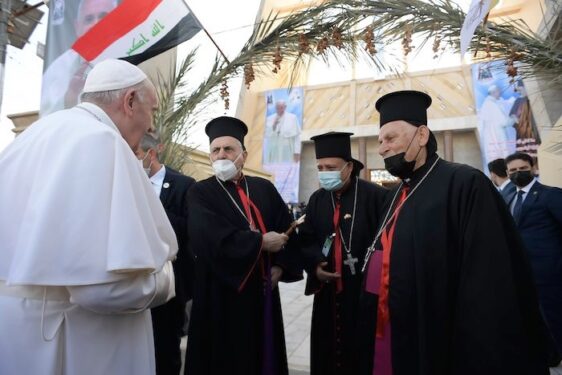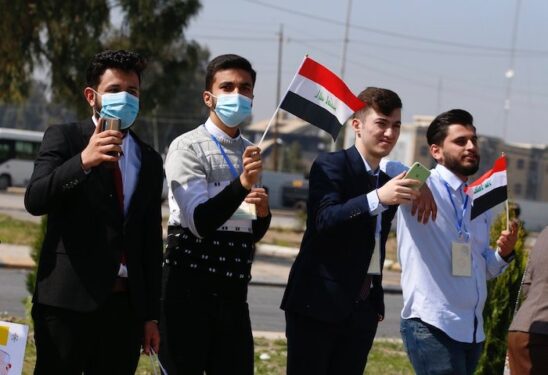
By Elise Ann Allen
ROME (Crux) — For Iraqis, the first week of August 2014 will forever be etched into their memory as the start of one of the worst episodes of religious and ethnic persecution the country has ever seen when the so-called Islamic State overtook the Plain of Nineveh.
Hundreds of thousands of Christians, Yazidis, and even moderate Muslims who did not share ISIS’s extremist interpretation of Islam were forced to either flee their homes and villages or pay an exorbitant tax to escape death.
[Related: For Iraqi Christians, Scenes of Both Horror and Hope]
During ISIS’s three-year rule, they killed swaths who refused or failed to live up to their strict code, looted Christian and Yazidi homes, and they burned these homes and countless churches and ancient monasteries to the ground.
The Plain of Nineveh was liberated in 2017; however, four years later, citizens — and minorities in particular — face many of the same questions they had when ISIS was still at large.
“Years after the end of this nightmare, with the vigor of the Iraqis and the help of the international community, Christians are still recalling this memory with pain and bitterness,” Iraqi Cardinal Louis Raphael Sako, Patriarch of Babylon of the Chaldeans, said in an Aug. 6 statement.

“This is an extrapolation of the reality of the situation, showing the fears of minorities and seeking the hope of sticking to the land and roots,” he said, noting that even seven years after ISIS, these fears have not gone away.
“Christians face fear and anxiety about the future, especially in the face of suspicious indicators,” Cardinal Sako said, citing “attempts at demographic change in their areas” and the failure of successive governments, “despite having money, to address the destruction of the infrastructure of their towns,” as among these indicators.
Churches, schools, homes, and other properties remain in ruins, unemployment is widespread, and many are unable to provide basic necessities.
“Had it not been for the Church that accompanied them in their physical, human, and spiritual displacement, built their homes, and helped them not lose hope for the future, none of them would remain in Iraq,” Cardinal Sako said.
With this still being the status quo almost a decade later, Cardinal Sako issued an appeal to the central government “to seriously consider whether it really wants Christians and other minorities to remain in Iraq.”
If so, he said the government needs to prove it “through actions, not speeches,” and he urged Iraqi leaders to restore to minorities “their rights and property because if the situation remains as it is, their future is toward immigration.”
When Pope Francis made his historic March 5-8 visit to Iraq, marking the first time a pontiff had ever traveled to the country, it was seen as a strong sign of support to the local Christian population, and a great moment of hope.
Several significant steps were taken by the government both during and in the lead up to that trip to assure Christians and other minorities of their importance to the fabric of Iraqi society, such as the declaration in December 2020 of Christmas as an annual national holiday.
During Pope Francis’ visit, Iraqi Prime Minister Mustafa Al-Kadhimi announced that March 6 — the day on which Pope Francis met with top Shiite cleric Grand Ayatollah Ali al-Sistani — would be a national day of tolerance and coexistence.
In the days following Pope Francis’ trip, Iraqi President Barham Salih ratified a new law benefitting Yazidi survivors of the 2014-2017 ISIS genocide.
However, despite the much-needed reinforcement the pontiff’s trip offered, the underlying problems for minority citizens have not gone away, and tough questions still remain for those grappling over whether they have a future in Iraq, or whether the time has come to move abroad.
To this end, Cardinal Sako in his statement offered several suggestions he believes will help ensure the survival of Iraq as a whole, but especially its minorities.
Among those suggestions was the establishment of “a real and strong state” characterized by factors such as “adherence to the law, respect for public money, the development of state institutions, hard work in terms of welfare.”
Cardinal Sako urged lawmakers to work for “a state of citizenship” which applies its laws “to everyone without exception, and respects every citizen as they deserve, without regard to his religion and race, but only because they are an Iraqi citizen.”
“This is a radical remedy for the decline in values through official, civic, educational, cultural, and media institutions, and the pulpits of mosques and churches,” he said.
Another factor Cardinal Sako said was key is the formation of a strong and united army, which acts “under a unified command” and is loyal not to one ethnic or religious group or another, but “to Iraq and the Iraqis.”
“This is the biggest challenge,” he said, insisting that Iraq’s justice system must also be strengthened so that the corrupt are held to account, “regardless of their rank,” and that public money siphoned off by those lining their own pockets is returned.
There must also be an end to religious sectarianism, he said, arguing, as he has in the past, that the state must consider religion “as a private matter between man and his God, with the right to practice religious rites freely and safely.”
Cardinal Sako also said extremism and fundamentalist terrorism must be more intentionally combatted by making more efforts in “preventing hate speech, criminalizing and holding accountable those who adopt and promote it, renewing education curricula, and spreading a culture of freedom, reason, enlightenment, and difference, through fieldwork on the ground.”
As a Catholic patriarch, Cardinal Sako voiced his support for all religious communities in Iraq, and stressed that his appeal is not just addressed to local leaders, “but I am speaking through international platforms,” in hopes that the international community will listen and help Iraq to achieve the stability its citizens still so desperately need.
